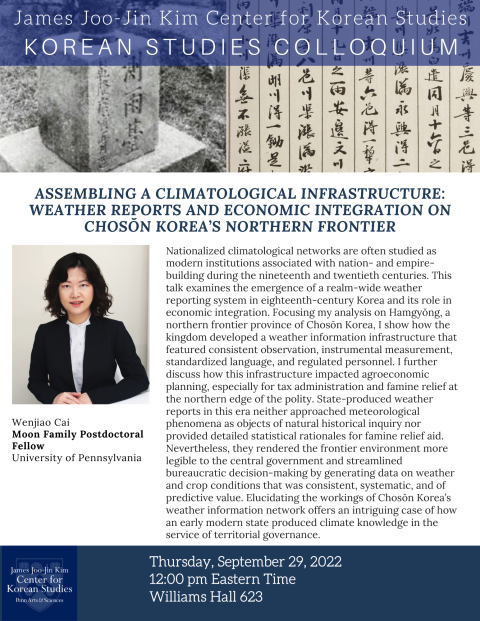
Korean Studies Colloquium
Williams Hall 623
Nationalized climatological networks are often studied as modern institutions associated with nation- and empire-building during the nineteenth and twentieth centuries. This talk examines the emergence of a realm-wide weather reporting system in eighteenth-century Korea and its role in economic integration. Focusing my analysis on Hamgyŏng, a northern frontier province of Chosŏn Korea, I show how the kingdom developed a weather information infrastructure that featured consistent observation, instrumental measurement, standardized language, and regulated personnel. I further discuss how this infrastructure impacted agroeconomic planning, especially for tax administration and famine relief at the northern edge of the polity. State-produced weather reports in this era neither approached meteorological phenomena as objects of natural historical inquiry nor provided detailed statistical rationales for famine relief aid. Nevertheless, they rendered the frontier environment more legible to the central government and streamlined bureaucratic decision-making by generating data on weather and crop conditions that was consistent, systematic, and of predictive value. Elucidating the workings of Chosŏn Korea’s weather information network offers an intriguing case of how an early modern state produced climate knowledge in the service of territorial governance.
Wenjiao Cai is a historian of Korea whose research and teaching interests lie at the nexus of environmental history, the history of science and technology, and borderland studies. While at Penn, Wenjiao will develop her first book manuscript, tentatively entitled Coping with the Cold: Nature and State on Chosŏn Korea’s Northern Frontier, a climate history of Chosŏn frontier expansion in P’yŏngan and Hamgyŏng provinces (in present-day North Korea). It examines the ways that the kingdom’s bureaucrats understood and responded to the frigid climate in northern Korea and how human-climate interactions shaped governance, economy, society, and the environment on the frontier. This project will offer a new ecological perspective on state-building in early modern Korea and bring Chosŏn climate knowledge production and environmental governance into discussions of world history. Wenjiao’s research has been supported by the Social Science Research Council, Korea Foundation, Kyujanggak Institute, and various research centers at Harvard University. She received her Ph.D. in History and East Asian Languages (HEAL) from Harvard University.
 James Joo-Jin Kim Center for Korean Studies
James Joo-Jin Kim Center for Korean Studies